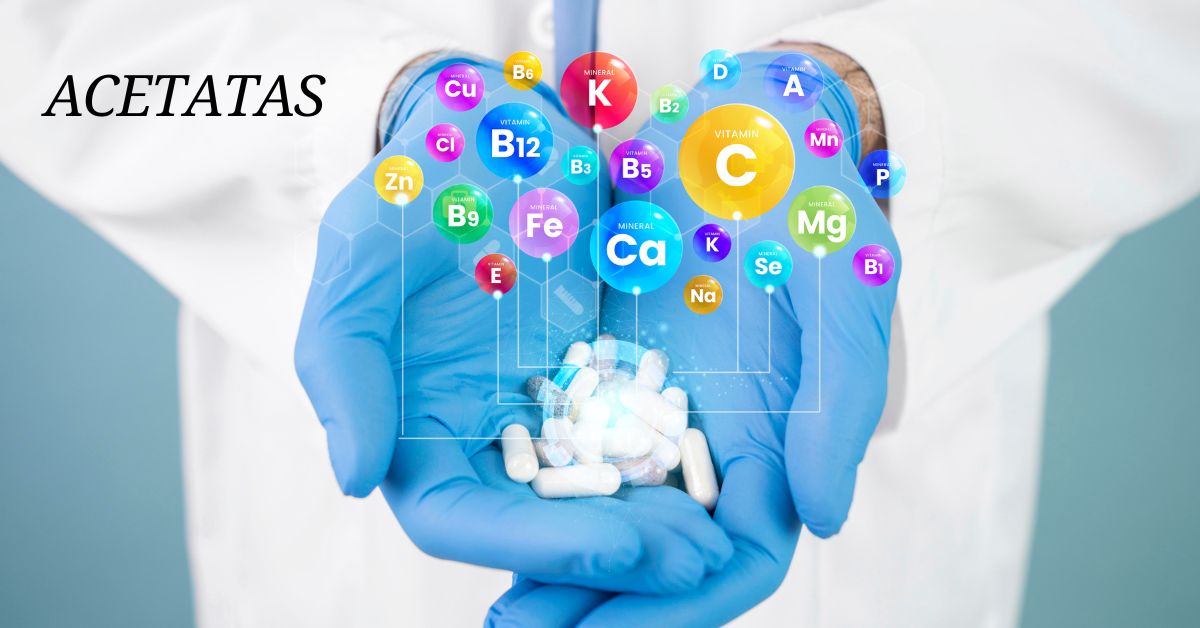Acetas, generally known as acetate compounds, are versatile chemicals used throughout various industries for their specific residences. Derived from acetic acid, acetatas play an important role in prescription drugs, textiles, and even food upkeep. This article explores the uses, blessings, and applications of acetatas, delving into how this chemical compound shapes ordinary existence and industry.
What is acetas?
Acetatas, or acetate, refers to the salt or ester form of acetic acid. The compound features a simple but effective chemical structure: a carbon, two oxygen atoms, and three hydrogen atoms. This composition allows acetates to bond with numerous substances, making them noticeably flexible.
Types of Acetates
There are multiple forms of acetatas, each with distinct uses. For example:
- Sodium Acetate: Commonly used in food preservation.
- Ethyl Acetate: Frequently discovered in adhesives and nail polish removers.
- Cellulose Acetate: Popular within the fabric and movie industries.
You May Also Like: Zebco 404 With Leather Antireverse Pic History
Common Uses of Acetatas
Acetates are utilized in several business packages because of their solubility, stability, and reactivity. Here are some commonplace programs:
- Manufacturing: Used in adhesives, paints, and coatings.
- Textiles: Applied to create fabrics that can be lightweight and breathable.
- Pharmaceuticals: Acetates serve as stabilizers and providers for medicinal drugs.
Acetatas in Everyday Products
Many family items incorporate acetates due to their non-toxic and stable nature. Some examples consist of:
- Nail Polish Removers: Ethyl acetate is often the principle ingredient.
- Food Additives: Sodium acetate facilitates preserving snacks and ready-to-eat meals.
- Cosmetics: Used as solvents in diverse beauty products.
Acetatas in the Textile Industry
One of the most commonplace uses of acetates is in fabric manufacturing, particularly in generating cellulose acetate fibers. These fibers are utilized in growing fabrics, which can be:
- Lightweight and breathable: perfect for decent-weather apparel.
- Shiny and Luxurious: Often utilized in nighttime put-ons and formal apparel.
- Wrinkle-Resistant: Ideal for low-upkeep clothes.
The Role of Acetatas in Food Preservation
Acetatas are broadly use in meal preservation because of their antimicrobial homes. Sodium acetate, especially, is approv by the FDA for use as a preservative. It facilitates preventing bacterial boom in processed foods, extending their shelf lifestyles without altering taste.
Medical and Pharmaceutical Applications
Acetates also play a vital function inside the pharmaceutical enterprise. They’re use as solvents in drug systems, enabling medications to dissolve and take in efficaciously within the frame. Additionally, acetates are utilize in focus drug delivery systems, ensure that medicinal drugs reach the intend regions inside the body.
Acetatas in Chemistry and Research
In laboratory settings, acetates function as essential reagents. Their reactivity permits them to facilitate numerous chemical reactions, making them essential in research and chemical synthesis. Acetates like potassium acetate are used in buffer answers, support solid pH ranges during experiments.
Environmental Impact of Acetatas
The environmental footprint of acetates is a subject of ongoing studies. While some acetates are biodegradable, others require recycling and right waste management. Many businesses are now exploring sustainable production methods to lessen the environmental impact of acetate production.
Recycling and Waste Management
Proper disposal and recycling of acetate substances are vital. Industrial waste management strategies focus attention on recycling acetate-primarily based substances, lowering landfill contributions, and minimizing pollutants.
Safety Precautions and Handling
Although acetates are normally secure, right management is important, specifically in commercial settings. Safety pointers encompass:
- Proper Ventilation: Essential while operating with unstable acetates like ethyl acetate.
- Storage Guidelines: Store acetates in cool, dry locations to prevent degradation.
- Personal Protective Equipment (PPE): Gloves and masks are endors to keep away from inhalation or skin touch.
Innovations and Future Applications
Research is ongoing into new programs for acetates. From biodegradable plastics to innovative meal maintenance techniques, acetates keep large capability. Emerging technologies are exploring the use of acetates in strength storage and sustainable packaging, showcasing their versatility and adaptability.
Comparison with Other Similar Compounds
Compared to similar compounds like alcohols and ketones, acetates offer specific benefits in terms of balance and solubility. These properties lead them to be best for programs requiring long-term garage and minimum reactivity, which includes prescribed drugs and cosmetics.
How Acetatas is Produce
Acetate production involves the reaction of acetic acid with a base or an alcohol. Major producers include chemical businesses that manufacture acetate for various industries, including prescribed drugs, textiles, and food production.
Global Market Trends
The call for acetates continues to upward push, push by way of increase in the pharmaceutical, fabric, and meals sectors. As sustainable practices become a concern, the acetate enterprise is likewise evolving to comprise eco-friendly manufacturing methods.
Economic Impact of the Acetatas Industry
The acetate industry has a full-size financial impact, contributing to a couple of sectors. Industries that include pharmaceuticals, meal production, and textiles rely closely on acetates for product components and upkeep, fueling international demand.
Conclusion
Acetatas, or acetates, are beneficial compounds with programs that span industries from food renovation to prescribed drugs. Their stability, versatility, and safety make them staples in several products and manufacturing processes. As generation advances, the function of acetates is expect to extend, opening new doors for innovation and sustainable practices.
FAQs
- What are acetates commonly used for?
Acetates are used in food preservation, pharmaceuticals, textiles, and many household items like nail polish removers. - Are acetates safe for consumption?
Yes, certain acetates like sodium acetate are approv by the FDA for use in food preservation and are consider safe. - Can acetates be recycled?
Yes, many acetate-based products are recyclable. Proper waste management practices help minimize environmental impact. - How do acetates benefit the textile industry?
Acetates provide wrinkle-resistant, lightweight, and breathable qualities in fabrics, making them ideal for various clothing types. - Are there any innovations involving acetates?
Emerging applications for acetates include sustainable packaging, biodegradable plastics, and improved drug delivery systems.





















